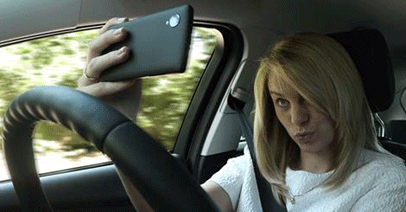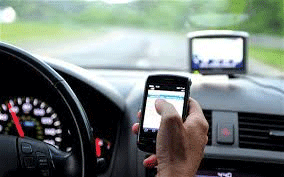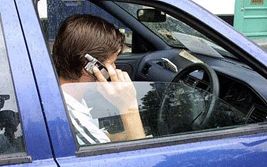Drivers Still Using Hand Held Mobile Phones
 Back in 2007 we ran an article about the use of hand held mobiles whilst driving a car. Today I see an article on www.motoringresearch.com about motorists are using their smartphones behind the wheel to take selfies, make video calls and even watch videos or catch-up TV. Please see this on our Facebook page.
Back in 2007 we ran an article about the use of hand held mobiles whilst driving a car. Today I see an article on www.motoringresearch.com about motorists are using their smartphones behind the wheel to take selfies, make video calls and even watch videos or catch-up TV. Please see this on our Facebook page.
Every week we observe commercial vehicles; where the occupants, especially drivers are either, smoking, using mobile phones or otherwise preoccupied whilst in a company vehicle.
This is dangerous and in breach of the law so I thought that I should remind everyone about this.
The two HSE cases this week both look at tragic accidents that shouldn’t have happened
- Paul Bowers, 47, was killed on January 26th 2013 when a pile of metal “stringers” delivered to the warehouse, in Hangar 14 of Cambridge airport, toppled on to him.
- Married Mr Evans, from Penarth, South Glamorgan fell approximately 4.5metres through a canopy on to the granite setts below. He received serious injuries as a result of the fall and died later in hospital.
As ever, if you have a subject that you would like us to cover one week, please contact us by phone 01458 253682, email or via our Facebook page, or by Twitter.
Drivers Still Using Hand Held Mobile Phones
 It is now twelve years since the UK Government introduced legislation to ban the use of hand held mobile phones whilst driving. In 2007, the penalties for transgressing this law were increased to a fixed £60 fine, together with three points on your licence.
It is now twelve years since the UK Government introduced legislation to ban the use of hand held mobile phones whilst driving. In 2007, the penalties for transgressing this law were increased to a fixed £60 fine, together with three points on your licence.
Combine these penalties with the potential of causing severe injury, or even death, and you would have thought there was ample reason not to use a phone whilst driving.
Every week we observe commercial vehicles; where the occupants, especially drivers are either, smoking, using mobile phones or otherwise preoccupied whilst in a company vehicle.
If this is true of you and/or your company’s drivers then you should read on and take note.
Many regional police divisions regularly undertake operations to ensure safer roads and driving, especially commercial drivers – remember it is your company name on the livery of the vehicle.
A police unit (Joint Operations Unit Roads Policing Unit), has been carrying out exercises across Buckinghamshire, Berkshire, Oxfordshire and Hampshire. As well as car drivers, they were targeting drivers of commercial vehicles on the M3, M4, M40, M25 and M27 motorways.
To give themselves a better vantage point from which to observe and film drivers’ behaviour, the police hired a lorry cab. They estimate that at least a third of the people being prosecuted for being distracted whilst driving were only caught because of the improved view provided by the lorry.
The first exercise was conducted over a five day period toward the end of 2013. As a result 65 drivers were prosecuted, the majority being in charge of commercial vehicles. Whilst most drivers were prosecuted for using a mobile phone, there was one observed using a laptop computer and drinking coffee at the same time.
A similar exercise this year resulted in a further 88 prosecutions – the majority again for using a mobile phone.
Sgt Paul Diamond, who led both operations, is reported as saying,
“The number of people using their phones is still very disappointing. If you are caught using your mobile phone whilst driving you will face a £60 fine and three points on your licence.”
Once again this is a wakeup call for employees who drive as part of their job and for their employers. It is worth repeating the same positive actions that we listed back in 2007:
For employers:
- Ensure you have a policy in place that clearly states that employees must not initiate or receive calls whilst driving and that to do so is a disciplinary offence. Ensure members of staff are aware of the policy and its
 implications for them.
implications for them. - Provide training and instruction on the dangers of using mobile phones and the company’s response for anyone who does.
- Check your working practices to ensure they don’t encourage drivers to use mobile phones.
- Ensure staff who are not driving are instructed not to initiate or receive calls from someone who is driving. If unsure, it is wise to ask immediately if the person at the other end is driving and, if so, terminate the call as quickly as possible.
- As a manager, ensure you lead by example.
For everyone:
- Ensure your phone is switched off or go to voicemail before driving. Bear in mind that driving includes queuing in traffic, stopped at traffic lights, etc.
- If you anticipate the need to make or receive calls during your journey, plan for safe places to stop (not a motorway hard shoulder), so that you can check for messages and respond accordingly without breaking the law.
- If you have a passenger, allow them to make any essential calls leaving you free to concentrate on driving.


To help you; the following is an example of a vehicle policy we recommend you adopt; we bring your attention to item 12.
If you are already using such a policy we would strongly advise it is introduced as a ‘tool-box’ talk and all staff members are reminded about it.
Company Vehicles Policy
- The Company absolutely prohibits operatives from driving, whilst under the influence of alcohol or drugs.
- Any driver taking prescription drugs must inform the company for approval to drive.
- Drivers must inform the company of any accidents, road traffic act offences or bans from driving. Drivers must also produce a current driving licence for annual inspection.
- The drivers of company vehicles must ensure that they and all passengers wear seat-belts at all times.
- Seats fitted to rear of vans for passengers must be secured to the chassis, forward facing and have seat belts. A partition/bulkhead must be fitted to stop loose materials flying forward in the event of an accident.
- Drivers must take all due care and consideration whilst driving. As a driver of a company vehicle they are an ambassador of the company and any aggressive behaviour i.e. road rage will directly reflect on the company and will lead to disciplinary action.
- Company vehicles must be kept clean and tidy.
- Drivers are required to inspect vehicle tyres, brakes, lights, wipers and horn daily and reporting any defect to their supervisor.
- The driver of the company vehicle is responsible for paying any road traffic act fines or parking tickets.

- Where multiple persons drive vans, cars or trucks then a log requires to be kept detailing driver times, dates, mileage, etc.
- The company prohibits smoking in company vehicles at all times.
- Mobile Phones – The company prohibits personnel from answering or using mobile phones (hand held), whilst driving. Drivers should stop at a safe convenient location and use the phone. Where vehicles are fitted with hand free systems, drivers should only answer or use phone when it is safe to do so.
If you have any questions about this or any other safety topic then Please contact us by phone 01458 253682, or email for more information and assistance.
Training Courses
 We only have a few courses set up for July and August as this is the holiday season.
We only have a few courses set up for July and August as this is the holiday season.
We have one course already arranged for September but there will be more to come so please keep watching.
These will include a 3 day Safety Management course for all owners and/or directors of SMEs and our new 3 day APS Accredited 3 Day Course in “The Management of Pre-Construction Health and Safety (2015)” – This 3 day course is suitable for those who wish to act as CDM advisors to Clients, Principle Designers and Contractors or Construction Safety Practitioners (details to follow).
The following are courses already arranged for July, August and early September
ASBESTOS AWARENESS – half-day course
This course is being presented by Jon Wilkins MSC RMaPS AIIRSM and Phil Collins BSc Hons DipSurv MRICS
Course Objective Training /CPD Certificate issued
Asbestos awareness training is essential for employees whose work holds the potential to expose them to asbestos. The Control of Asbestos Regulations 2012 puts a requirement on employers to ensure that their staff have undergone suitable asbestos awareness training so that they are aware of the potential dangers they may face and also the procedures they must follow in the event they are working in the vicinity of asbestos containing materials (ACMs)
Who Is This Course Suitable For?
The main groups of workers that are deemed to be at risk from asbestos exposure and therefore the groups most requiring asbestos awareness training are as follows:
- General Maintenance Staff.
- Electricians, Plumbers & Gas Fitters. Painters & Decorators.
- Construction & Demolition Workers. Joiners and Plasterers.
- Computing & Telecommunications Engineers.
- Heating & Ventilation Engineers.
- Roofers.
- Architects & Building Surveyors
- Fire & Burglar Alarm Installers

Amosite (Brown) – Chrysotile (White) – Crocidolite (Blue)
Syllabus:
- Asbestos- a history of use
- What is Asbestos
- Amosite (Brown) – Chrysotile (White) – Crocidolite (Blue)
- Asbestos Containing Product Examples
- Asbestos Properties and the hidden legacy of asbestos
- Control of Asbestos Regs and Requirements
- Exactly who is at risk
- Action to take on discovery and Survey and Recording
Course Duration:
½ day
| COURSE REF | DATE(s) | LOCATION |
|---|---|---|
| ASBESTA 1501 | Thursday 30th July 2015 | Taunton Racecourse,Orchard Portman,Taunton,Somerset,TA3 7BL |
Fee: £60 to include Course notes, Coffee/Tea on arrival & mid-morning refreshments, CPD Certificate of Training (Fee subject to VAT)
Emergency first-aid at work – one-day course
Under the Health and Safety (First-Aid) Regulations 1981, it is the responsibility of the employer to ensure they provide adequately trained persons to cover their First-aid requirements. The following course has been approved and recognised by the HSE as meeting the basic requirements set by the regulations.
Who Is This Course Suitable For? 
- Smaller companies
- Offices and shops with less than 50 employees and other low risk environments
- Employees working off site
- Self-employed people
- Anyone who wants to learn first aid and assist in an emergency situation.
SYLLABUS
- First Aid Kits
- How to manage an incident
- Treating an unconscious casualty
- Resuscitation and CPR
- Asthma
- Choking
- Chest Pains

- Seizures
- Bleeding
- Shock
- Burns and Scalds
- Care and Communication
- Open Forum
Course Duration:
1 day
| COURSE REF | DATE(s) | LOCATION |
|---|---|---|
| WSG. EFA . 1501 | Wednesday 12th August 2015 | Taunton Racecourse,Orchard Portman,Taunton,Somerset,TA3 7BL |
Fee: £120 to include Course notes, mid-morning & afternoon refreshments, Finger buffet lunch and a Certificate of Training (Fee subject to VAT)
CDM Regulations 2015 – for the Smaller Builder – half day course
Course Objective:
The Construction (Design and Management) Regulations 2015 (CDM 2015) come into force on the 6th of April 2015, and will apply to all construction projects in the UK incl. Domestic projects
This CDM 2015 awareness training course has been developed to provide smaller builders and tradesmen, especially those who haven’t dealt with CDM before, with an understanding of their role and responsibilities under CDM 2015.
Seminar Outline:
- Introduction to CDM 2015

- Domestic Client Duties
- Principal Designer Duties
- Designer Duties
- Principal Contractor Duties
- Sub-Contractor Duties
- CDM Documentation
- Benefits of Attending
This course give an overview of the requirements for smaller builders and domestic clients and how the regulations apply to all construction projects from minor repairs and decorating works through to building a new house for a domestic client.
Course Duration:
1/2 day
| COURSE REF | DATE(s) | LOCATION |
|---|---|---|
| CDM2015 1507 | Tuesday 8th September | Taunton Racecourse,Orchard Portman,Taunton,Somerset,TA3 7BL |
Fee: £80 to include Course notes, Coffee on arrival & mid-morning refreshments and a Certificate of Training (Fee subject to VAT)
For more information and to book and pay on line please visit our training page.
If you have any questions about these courses or any other training or would like us to run a particular course for you, call Jon Wilkins of the Wilkins Safety Group on 01458 253682 or email him.

Your Business is Safer in Our Hands
